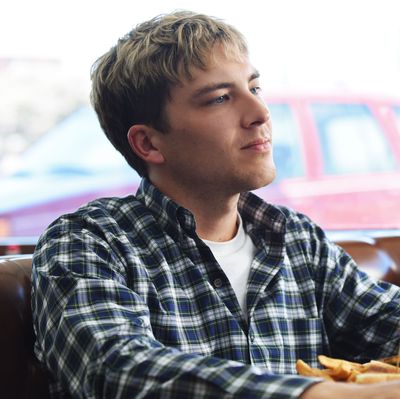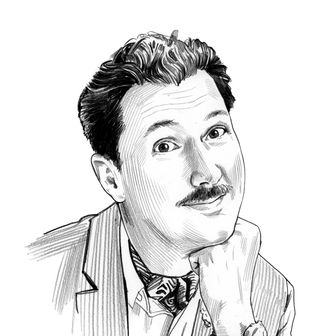
For a show with “Gianni Versace” in its title, we sure haven’t seen a lot of Gianni Versace the past couple of weeks. This is the second episode in a row that totally drops the story of the fashion designer, his family, and the aftermath of his murder to examine the killing spree and motivations of his killer, Andrew Cunanan. Last week I was willing to take a diversion, mostly thanks to Judith Light playing Marilyn Miglin, but now I’m starting to miss Gianni.
Part of the allure of this series, at least based on the first two episodes, was the Versace of it all. The lush clothes, the ornate interiors, and the cadre of sexy half-naked boys running around made for some really great viewing. As did the parallels between Versace and his eventual killer, who both deal with issues of being gay in America but from different ends of the spectrum. But that show seems to be over. Instead, we’re looking at a brutal murder in a greige loft in Minneapolis. Where are all of the flowing silk dressing robes I was promised?!
The other strange thing about the way ACS: Versace is unfolding, as I mentioned last week, is that we’re still only guessing at Andrew’s motivations. Just like in “A Random Killing,” we get to really humanize his victim — this time architect and former lover David Madson — while Andrew is once again seen as this vicious, calculating monster with a chip on his shoulder. That chip is easily the most interesting part. If we could understand why he’s doing what he’s doing, the action would seem a lot less murky. However, his victims certainly didn’t have that luxury and maybe that’s the point.
From what we can tell, Andrew kills David’s secret lover Jeff (the briefest of cameos by Ryan Murphy regular Finn Wittrock) because David refused to marry Andrew. He tells David that he was his “last chance at happiness” before he goes on his crime spree. David says he dismissed Andrew by telling him it is illegal to get married, a reality of gay life in 1997 that seems so odd and distant considering the state of gay civil rights in the 21st century.
Andrew is really trying to make a life with David, yet another of the many fictions of fabulousness he constantly spins, but David knows it’s impossible. Still, Andrew is strangely tender with him, washing Jeff’s blood off his body in the shower and then trying to comfort him. There’s even something sweet about the way that Andrew moves Jeff’s body on his own, only asking for David’s help when he absolutely needs it, a touch that is as scary as it is heartbreaking.
There does seem to be something about Andrew that is just aping emotion. We see it later in the car, when Andrew tries to get the party started by turning up “Pump Up the Jam.” He doesn’t seem to realize how wildly inappropriate it is, or that Jeff would be mourning his dead friend. We also see it in Andrew’s menace, when insisting he walk the dog with David or when he’s ordering him around the house. It’s like he can’t see why David doesn’t love him. Maybe it’s because he’s so invested in believing these reveries that he creates for himself, where he’s a wealthy set designer from New York with a society family and famous friends. The only way Andrew can feel loved and wanted is if he feels superior.
What Andrew does understand is how police investigations work, or at least how the police completely fail to understand gay people. Andrew leaves all sorts of porn and sex toys out on David’s bed before they flee so that the cops will think it’s some sort of sex crime gone wrong. He knows that as soon as they find out this is a gay case, they’ll be distracted by their stereotypes and misinformation about gay life and he’ll have that much more of a jump on them. Andrew tells David that if he calls the police, they “won’t see two victims, they’ll see two suspects,” which is how Andrew gets him to go along with being on the lam. My one question is why does a man like David, who has a Twink Bottoms of Mykonos DVD, also have a copy of Bear Love magazine? Based on Andrew and Jeff, David very clearly has a type and it is not anyone who is hairy.
The cops certainly play their part according to plan, assuming that David must be the killer, just like Andrew said they would. They even go so far as to tell David’s parents that there are all sorts of things they don’t know about their son, effectively prosecuting him before he’s even been charged. All of this because he was known to be gay, so they just assume he’s up to all sorts of horrible business.
David’s relationship with his family is the truly heartbreaking part of this episode, even if it is played more than a little heavy-handed. Newcomer Cody Fern does an excellent job playing David, even though the stories about him going hunting with his father and his coming out feel like a mixed bag. On one hand, those are experiences that many gay men, especially in the ‘80s and ‘90s, had with their fathers. But on the other hand, it’s so typical to be almost cliché.
The coming-out scene is especially strange: David’s father says that he doesn’t like gay people or what they do, but he will always love his son. Is that supposed to make us angry at the father? Is it supposed to endear him to us? It’s certainly supposed to make it sadder when he eventually loses his son and never gets to tell him how proud he was of him, but he kind of already did that. Real life is never as neat and clean as a 60-minute television drama, but this is a 60-minute television drama. Adding those scenes had to serve some purpose other than just muddying the waters.
David’s murder, obviously, is tragic, but I wanted him to fight back so many times. I wanted him to escape when they were in the restaurant watching some sad girl in a shitty bar sing a slow song like this was True Detective season two. I wanted him to cause a scene in one of the many public places where Andrew wouldn’t be able to shoot him without a street full of witnesses. I wanted him to really escape into that cabin and have a chance of making it, instead of just imagining it while his ex-boyfriend shot him in the back. But none of that ever happened. Life isn’t as lucky for actual people as it is in most television dramas, especially when you’re a gay man in America in the ‘90s and the deck is stacked against you. That’s the tragedy of everyone in this series, but this week, I feel the worst for David.


